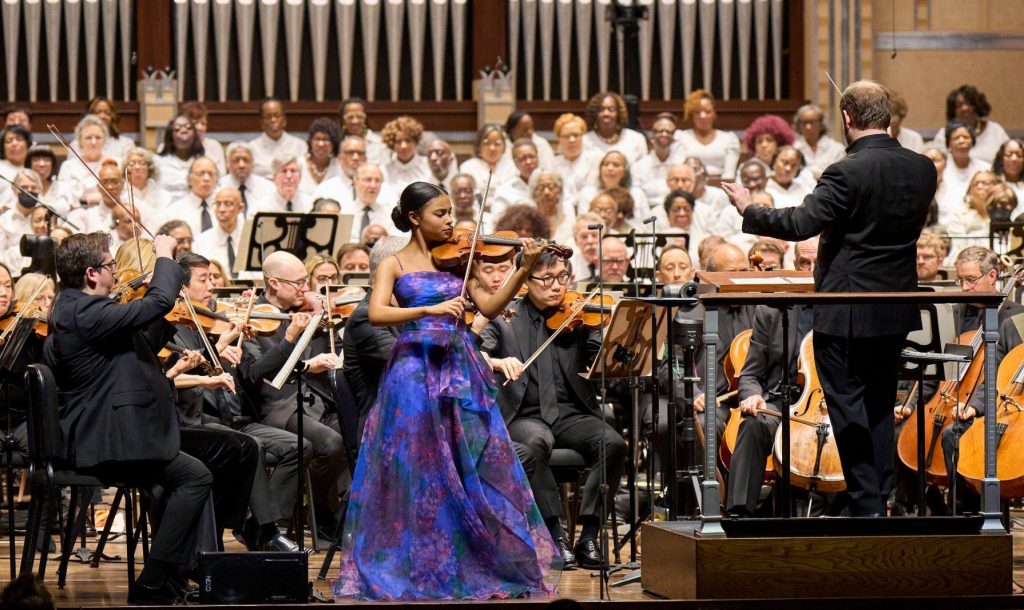Originally published on Cleveland.com
Photo by Roger Mastroianni
by Kevin McLaughlin, Cleveland Classical
CLEVELAND, Ohio – The Cleveland Orchestra hosted a varied program Sunday celebrating Martin Luther King Jr.’s birthday and commemorating the passage of the Civil Rights Act of 1964.
The 44th annual concert, held in the Jack, Joseph and Morton Mandel Concert Hall at Severance Music Center, marked the landmark law that prohibits discrimination based on race, religion, sex, or national origin.
Former longtime WEWS news anchor Danita Harris emceed with panache; Daniel Reith, the orchestra’s assistant conductor, was an effective presence on the podium, and Dr. William Henry Caldwell directed the all-volunteer Martin Luther King Jr. Celebration Chorus with grace and poise.
MLK concerts always have a bonding effect on their audiences. The inspirational speeches, religious and patriotic music, and the charm of their hosts all wear down shells of resistance, and before you know it, strangers have become neighbors.
Especially this year, civil rights were foremost in mind. The law’s passage 60 years ago lent a reason to celebrate but also cause to worry.
“A threat to justice anywhere is a threat to justice everywhere,” Harris said. “All progress is precarious.”
James Weldon Johnson and John Rosamond Johnson’s “Lift Every Voice and Sing” was sung with noble simplicity by the ably conducted Celebration Chorus. The hymn was first performed by 500 Black American students from the segregated Florida Baptist Academy in Jacksonville, Florida, in 1900. Here chorus members were placed around the hall – including in the boxes – creating something of a musical hug. This hymn has not lost anything as a symbol of pride and patriotism among Black Americans – as evidenced by many in the audience who rose to join in.
“An American Port of Call” was the orchestral opener, composed in 1985 by Adolphus Hailstork III. An overture about a city (Norfolk, Virginia), it is noisy, with lots of help from the brass section. Though Harris promised African, Native American and European influences in her introduction, I heard only American inspirations, especially jazz.
The chorus was featured in three traditional spirituals: “A City Called Heaven,” a gospel hymn associated with King’s friend and singer Mahalia Jackson; “Ain’t Got Time to Die” and “Amazing Grace.”
Under Caldwell’s assured direction, the voices were powerful instruments of the spirit. Steven Weems, the soloist in the second piece, stood out, his powerful tenor resonating to the back of the hall, thrilling listeners with the words, “Lord, I keep so busy servin’ my Master, Ain’t got time to die.”
James P. Johnson’s Harlem Symphony, composed during the 1930s, was performed at Carnegie Hall in 1945 with Johnson at the piano. “Night Club” (the scherzo) is the jazziest of the symphony’s three movements. The Clevelanders took the composer of the well-known “Charleston” to heart and let the movement kick up its heels. Trumpeter Michael Sachs shone in the spotlight. An odd programming choice was the fourth movement of Amy Beach’s Gaelic Symphony. Beach had famously criticized Anton Dvorak for relying on “Negro melodies” as authentically American.
“We of the North,” she told the Boston Herald, “should be far more likely to be influenced by the old English, Scotch or Irish songs inherited with our literature from our ancestors.” Oh well: It’s a strong piece and was nicely played. With Reith at the helm, all the ruggedness – and later the lyricism – of the Celtic themes came through.
It was a treat to hear Allison Loggins-Hull’s “Can You See?” for the second time – the first was at the work’s premiere last spring. The piece is a commentary on “The Star-Spangled Banner,” particularly the line “land of the free.” Although the work borrows melodic material from the National Anthem, Loggins-Hull stretches it out and fragments it in such a way that it takes on a somber aesthetic that seems to probe the very idea of patriotism. Written just after George Floyd’s murder, there are sounds resembling police sirens (clarinets and horns) suggesting urban despair. There is optimism, too, as sustained strings steer toward a final resolution in a major key.
Violinist Amaryn Olmeda, first-prize winner at the 24th annual Sphinx Competition, is a remarkable talent. And at 15, she is no mere hotshot – she plays with nuance and fresh interpretive ideas, investing more into Ravel’s “Tzigane” than just faux-Gypsy showiness. The crowd responded to her every impetuous gesture and flourish, applauding quickly at every pause and then extravagantly at the close.
Ernest Bloch, a Jewish Swiss immigrant who moved to the United States in 1916 and became the first president of the Cleveland Institute of Music four years later. He wrote “America, an Epic Rhapsody” as a love letter to his newfound country and entered it in a contest in 1926. The third movement, “1926: The Present-The Future,” is rousing and patriotic, as the orchestra marches and the chorus enthuses (“America! America! /Thy name is in my heart…/My love for thee arouses me/ to nobler thoughts and deeds.”) Bloch was a consummate craftsman, and the rhapsody is effectively and colorfully scored. While the program might have been improved by its absence, the audience was appropriately roused, applauding wildly after the final chord.
The strains of a beautiful new arrangement of “Amazing Grace” by Tim Berens accompanied us all into the night.
Published on ClevelandClassical.com January 16, 2024.
Click here for a printable copy of this article




